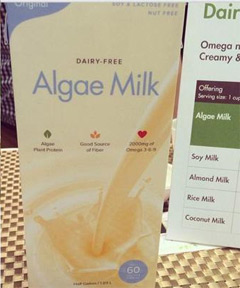fitness news
![]() ,
,![]()
Font size Nutrition & Wellness
Algae milk: A new dairy, soy, lactose and nuts free diet for vegans
– Reported, March 27 2014
 A new milk product might be coming to town and you might be surprised where it comes fromalgae. A San Francisco-based company Solazyme, who is a leading innovator in microalgae, introduced algae milk at the Natural Products Expo West convention last week. The product was touted as being allergen-free; that is, free of dairy, soy, lactose, and nuts. This makes it potentially a great source for and individuals on a limited diet.
A new milk product might be coming to town and you might be surprised where it comes fromalgae. A San Francisco-based company Solazyme, who is a leading innovator in microalgae, introduced algae milk at the Natural Products Expo West convention last week. The product was touted as being allergen-free; that is, free of dairy, soy, lactose, and nuts. This makes it potentially a great source for and individuals on a limited diet.
It actually first comes from a flour that is made from microalgae grown in man-made industrial vats (instead of natural bodies of water). This flour was developed to help food manufacturers make healthier products with lower saturated fat and higher protein content, and it’s one of many whole algalin flours within the companys product line Almagine HP.
contains 50% protein, 20% fibers, 10% healthy lipids (microalgae in general is a great source of omega-3 fatty acids), plus several micro nutrients and trace minerals. However, it’s unclear what the exact nutrition breakdown per eight ounces of this milk is and what other ingredients might be added.
At present there are a lot of dairy alternatives on the market: soy, rice, almond, and coconut milk. Patients are advised to choose a variety that has the most protein and least amount of sugar and saturated fat, meaning rice and coconut milks are not ideal.
At the Natural Products Expo West convention which took place this past weekend, renewable oils and bioproducts company, Solazyme (SZYM), showcased some of its latest food products. The company served samples of algae milk, an alternative milk product free of dairy, soy, lactose, and nuts. The product was made using Solazyme’s whole algal flour.
Solazyme claims on its website that it has developed algae-based food ingredients including oils and powders that enhance the nutritional profile and functionality of food products, while reducing costs for consumer packaged goods (CPG) companies.
When used in full or as partial replacement for ingredients such as eggs, butter and vegetable oil, our products offer superior health benefits, including reduced calories, saturated fat and cholesterol, and functional benefits such as enhanced taste and texture for low-fat formulations, while also providing lower cost handling and processing requirements.